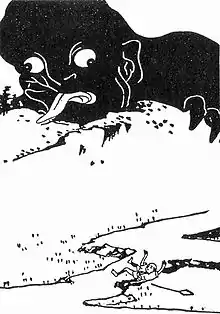Daidarabotchi
Daidarabotchi (ダイダラボッチ, 大座法師) was a gigantic yōkai in Japanese mythology, sometimes said to pose as a mountain range when sleeping.

Mythology
The size of a Daidarabotchi was so great that his footprints were said to have created innumerable lakes and ponds. In one legend, a Daidarabotchi weighed Mount Fuji and Mount Tsukuba to see which was heavier, but he accidentally split Tsukuba's peak after he was finished with it.
The Hitachi no Kuni Fudoki, a recording of the imperial customs in the Hitachi Province compiled in the 8th century, also told of a Daidarabotchi living on a hill west of a post office of Hiratsu Ogushi who fed on giant clams from the beach, piling the shells on top of a hill. In the larger Ibaraki Prefecture, Daidarabotchi was considered a benevolent giant, moving mountains to aid the people of Ibaraki. In Mito, Ibaraki, a 15-meter statue was erected in Ogushi Kaizuka Park to commemorate the yōkai and its myths.[1]
Izumo no Kuni Fudoki also mentions a legendary king of Izumo, Ōmitsunu, who was the grandson of Susanoo and a demi-god. Having the strength of a giant, he performed Kuni-biki, pulling land from Silla with ropes, to increase the size of his territory.
The Daidarabotchi was also said to reside at Mount Togakushi, where there exists a pond on its south side bearing its name.[2]
See also
References
- Le Blanc, Steven; M., Masami (12 September 2019). "Face to face with Ibaraki's giant Daidarabotchi, not so bad after all and a bit of a looker". Sora News. Retrieved 24 March 2023.
- Wakamori, Tarō (1989). "The Hashira-matsu and Shugendo". Japanese Journal of Religious Studies. 16 (2–3): 2–3. doi:10.18874/jjrs.16.2-3.1989.181-194. Retrieved 24 March 2023.